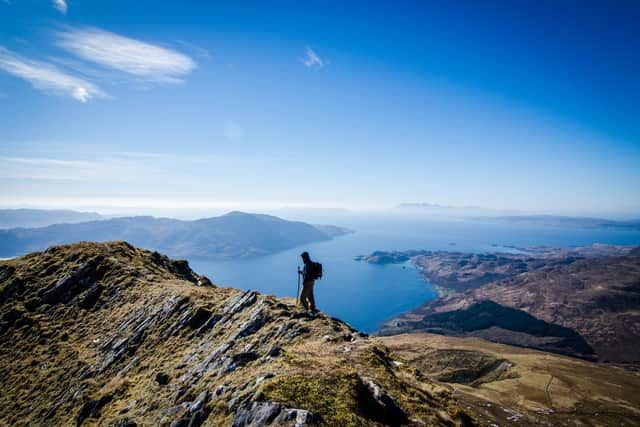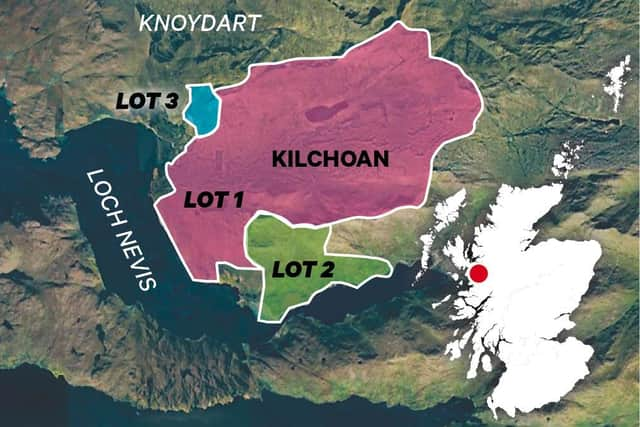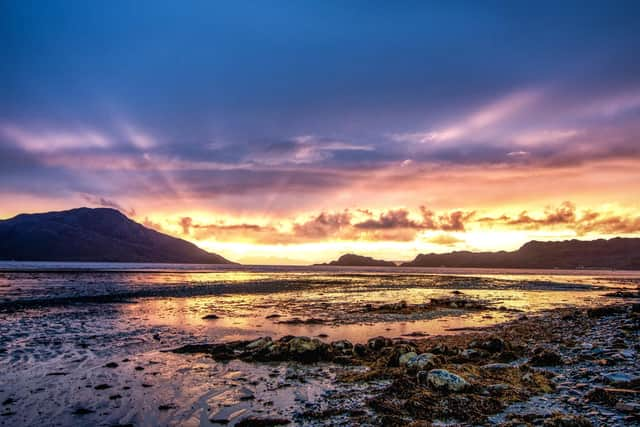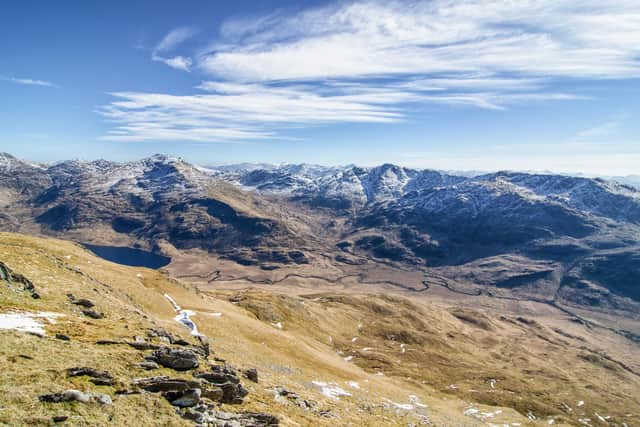Revealed: One of Scotland's 'last great wildernesses' bought by billionaire industrialist
Kilchoan estate, which spans more than 13,000 acres across the remote Knoydart peninsula in the west Highlands, is now under the ownership of Christoph Henkel, who inherited a vast shareholding in the chemical and consumer goods empire founded by his great-grandfather.
The 64-year-old described his ownership of the sprawling estate as a “privilege and responsibility”, and has set out plans to rewild Kilchoan and revamp its tourist accommodation to sit alongside his other luxury properties in the US and the Caribbean.
Advertisement
Hide AdAdvertisement
Hide AdHowever, his purchase of one of Scotland’s most idyllic landholdings has reignited debate over the concentration of rural land ownership in the hands of only a few wealthy individuals.
Community Land Scotland, the representative body of community landowners across the country, said the deal underlined the “pressing need” for further laws to empower communities instead of “enabling the super rich to become 21st century lairds”.
The far-flung peninsula has long been a central narrative in the vexed story of Scotland and its land. Its population was devastated during the Highland Clearances, and nearly 75 years have passed since a small band of men staked out a claim to land at Kilchoan, then owned by Lord Brocket, a Conservative MP and Nazi sympathiser.
Though their cause was ultimately unsuccessful, with Kilchoan remaining in private hands ever since, the so-called Seven Men of Knoydart became a national cause célèbre. Their plight, commemorated in song by Hamish Imlach, emboldened successive generations of nationalist politicians and community land campaigners, and foreshadowed the historic community buyout of the neighbouring Knoydart estate in 1999.
With the issue of land reform riding high on the current Holyrood legislative agenda, the fact that a large parcel of the peninsula has once again changed hands between wealthy private owners will intensify debate.


Mr Henkel has promised to work alongside the community, take a “measured and balanced” approach to rewilding, and ensure that Kilcoah remains “as remote and untouched as possible”.
Since taking over the estate, Mr Henkel and his wife, Katrin, have started realising their vision of its future. Supplies and equipment have been shipped by barges from Mallaig to Inverie, and a series of planning applications have been lodged with Highland Council with a view to transforming Kilchoan into a visitor destination fit for the 21st century.
But questions have already been asked by those in Knoydart about the extent to which the billionaire is engaging with a community with a rich yet often afflicted history.
A billionaire with esoteric tastes in property


Advertisement
Hide AdAdvertisement
Hide AdAlthough he is one of the richest men in Europe, Christoph Henkel has a distinctly low profile, and he would prefer it stays that way. Originally from Düsseldorf, he has lived in a five-storey Victorian townhouse in London for the best part of the last quarter century along with Katrin, a retired art dealer who specialised in Old Master drawings, and whose private collection includes works by Rembrandt and Lucian Freud.
At the turn of the millennium, he inherited the stake owned by his late father, Konrad, in Henkel AG, the firm founded by his great-grandfather, Friedrich. What began in the 1870s as a modest detergent factory has grown into one of Germany’s economic powerhouses.
You may not know it, but you probably bought several of its products during your last visit to the supermarket. The firm owns a slew of everyday household products, such as Persil, Sellotape, and Unibond, as well as leading beauty brands such as Schwarzkopf.
Only last week, it announced an operating profit for 2021 of £2.25 billion, up more than four per cent on the previous year thanks to what management described as “significantly higher sales volumes, successful price increases, active cost management, and ongoing structural adjustments”.


The subsequent promise of generous dividends has pleased the company’s shareholders, but it is Mr Henkel, as the largest single stockholder, who will benefit the most. The windfall will further bolster his fortune, which Forbes estimates at £1.2bn. The latest Sunday Times Rich list put the figure even higher, at £1.4bn, and suggested he had increased his wealth by around £64m since the pandemic began.
Though it is not uncommon for billionaires to spend their money on property, Mr Henkel’s tastes are relatively esoteric. His first major acquisition came in the early 1990s, when he visited Dunton, an abandoned homestead nearly 9,000 feet high in the San Juan mountain range in the US state of Colorado.
Once a thriving settlement frequented by gold miners, trappers and prostitutes, it fell into a sharp decline in the mid 20th century, becoming a hideaway for hippies, bikers, and artists before its status was reduced to little more than a ghost town by the time Mr Henkel happened across it.
He was smitten, and set about turning it into Dunton Hot Springs, now established as one of the most luxurious and sequestered resorts in the US. He and his wife restored its 19th century log cabins and installed a plethora of mod cons fit for corporate retreats and weddings. Rooms which were once available for a few dollars now command fees of up to £2,300 a night. The actor, Lily Collins, star of the hit Netflix series, Emily in Paris, held her wedding there last autumn.
Advertisement
Hide AdAdvertisement
Hide AdThe US enclave, together with a plantation-style village on the picturesque Caribbean island of Mustique, eventually became part of Mr Henkel’s firm, Dunton Destinations, which projects a vision of “authentic, immerse experiences” in some of the world’s “most striking locations.” Now, a not so little slice of Scotland forms part of the mix.
‘One of the last great wildernesses left on mainland Britain’


Kilchoan, owned for years by the Delwart family from Belgium, had already been on the open market for six months by the time Mr Henkel first visited it in November 2019. A friend in London had told the German about the peninsula years ago, and when he caught wind that one of its prized estates was up for sale, he could not resist enquiring further.
“I was just blown away by it,” he told Scotland on Sunday in his first interview since purchasing Kilchoan. “I really had no long-term plan to acquire anything in Scotland. But when I saw Kilchoan and Knoydart, it spoke to me.”
He was not alone. Bidwells, which marketed the sale, received enquiries from parties as far afield as Russia, South Africa, and Australia. Kilchoan’s location - with no road network, the glorious knuckle of land is only accessible by ferry, or a bracing two-day hike - meant that some prospective purchasers used private jets and helicopters to view the property, and take in its expansive views across to Eigg, Rum, and the natural majesty of the Inner Hebrides.
Bidwells said it was a “once in a generation” opportunity to acquire one of Scotland’s finest estates, and described Kilchoan as “one of the last great wildernesses left on mainland Britain”, with “exceptional quality country sport” and five kilometres of river.
In the end, it was Henkel who won out, finalising a deal just weeks before the first lockdown of the coronavirus pandemic came into force. While some prospective purchasers were put off by the remoteness of a place known in Gaelic as Na Garbh Chriochan - the Rough Bounds - he was drawn to it. “I was probably the first one who the seller saw who said, ‘Great, it doesn’t have a road’,” he recalled.
It is not known what Mr Henkel paid for the various lots, but records of one land sale held by Registers of Scotland show a purchase price of £1.2m. The latest accounts for Kilchoan’s newly incorporated estate company, which counts Mr Henkel as its sole director, values its investment property at £4.2m.
Records filed with Companies House show that the shareholdings in that firm - Kilchoan Estate Company (Knoydart) Limited - together with the shares in its management company, Kilchoan Management (Knoydart) Limited are ultimately held by a trust, Kilchoan Holdings, registered in St Helier, Jersey.
Advertisement
Hide AdAdvertisement
Hide AdMr Henkel, however, sees no issue with the offshore arrangement. “We have a trust,” he explained. “It’s not something I’m hiding from anybody. It’s the advice I was given at the time and I took it.”
Neither does he regard in any way controversial the fact his estate firm claimed tens of thousands of pounds in taxpayers’ money via the UK government’s Covid-19 job retention scheme. “Yes, we took furlough money for two people out of four or five we had,” he said. “They had nothing to do and were sent home. We had no income because of Covid like many other people.”
The pandemic has hindered his plans for the estate and complicated his own visits north, but he managed to spend six or seven weeks at Kilchoan last year, where he met with some of the locals.
He intends to return in May en route to the US to attend to his other business interests, which include a sizable shareholding in a manufacturer of Zeppelin-style hybrid airships - Bruce Dickinson, the lead singer of veteran heavy metal band, Iron Maiden, is among his fellow investors.
Mr Henkel said he is excited at the prospect of “enhancing” the estate, just as he and his wife did with their Colorado property. “There is one thing which the places have in common - people love to come and stay in wild places, and sleep in a comfortable bed at the same time.”
‘I love what you've done with it, however you've priced us out of the market’
Even to those who can afford it, such comfort comes at a price. The old farmhouse at Kilchoan was one of the first properties to be overhauled by the Henkels. The work has been praised by longstanding visitors to the peninsula, although the costs involved have not gone unnoticed, with a £1,250 nightly rate now in place during spring and summer.
“We used to book the farmhouse,” one tourist wrote on Kilchoan’s Facebook page earlier this month, wishing the Henkels “all the best” for the future. “I love what you've done with it, however you've priced us out of the market,” she added.
Other properties on the estate, including the three-bedroom Tigh na Broc and two-bedroom Tigh na Dobhran, have also undergone renovation, and Mr Henkel has plans to add further accommodation, although he stressed it would represent a modest increase, and declined to put a figure on how much he intends to invest.
Advertisement
Hide AdAdvertisement
Hide Ad“We’re adding a few buildings because the ones we have now are basically falling down,” he reasoned. “A barn is falling apart, and we’re taking it down and rebuilding it and making it energy efficient.
“Will we be successful in getting people to come? That’s the entrepreneurial question. I can’t give you the answer but we have some interest.”
The Henkels have also applied to Highland Council to build a yoga studio, gym, and sauna, as well as a new-build house. A design statement lodged as part of the latter application describes it as “the applicant’s main home at Kilchoan,” although Mr Heknel said his family have no plans to move to the peninsula permanently.
“We don’t really plan to have a house there, this is just one of the buildings we plan to have for guests. Of course, we’ll use it like others, I’ve slept in every place on the estate.”
Either way, the proposal has drawn concern from the local authority’s archaeology team, given the property would be built alongside the Fank, a 19th century structure regarded as being of “local historic importance” and a “surviving fragment of Knoydart’s agricultural history”.
The Knoydart Foundation, the charity which manages the former Knoydart estate and which has taken major steps to reverse the historic decline and instability of the peninsula, has also raised concerns.
In submissions to the local authority, Craig Dunn, its operations manager, said there has been “scarce pre-application engagement” by Mr Henkel with the community, and requested an assessment of the development’s impact on the local infrastructure.
At a meeting of the foundation’s community directors in December, meanwhile, an agreement was struck to write to Mr Henkel to “highlight the need to communicate with the community” via South Knoydart Community Council.
Advertisement
Hide AdAdvertisement
Hide AdThat is not the whole story, however. Since then, the community council has held a public meeting via Zoom in collaboration with Mr Henkel and his architects. In a statement, the community council said that there was a “good turnout”, and that the presentation given by Kilchoan abouts its plans was “well received by the community”.
Mr Henkel admitted that he had not yet had a “proper meeting with lots of people”, but described the response from the community so far as “great”.
“It has an interesting group of neighbours,” he added “It’s just extraordinary. It’s a wonderful part of the world.”
One active resident in the Knoydart community, who did not wish to be named, said there was reason for cautious optimism when it comes to Mr Henkel’s ambitions.
"Tourism is essential to somewhere like Knoydart, and if someone is willing to invest their own money in a sensitive way, people will support it,” they explained. “Is there concern that the kind of development is right for Knoydart? There is always that concern.”
‘I don’t know what to say. It was for sale, I bought it, and there we are’
Elsewhere, the reaction to the German’s purchase of Kilchoan is distinctly less warm. Ailsa Raeburn, chair of Community Land Scotland, a charity which believes the issue of land ownership is integral to hopes of creating a more socially just nation, said that the concept of “billionaire absentee landowners buying large rural landholdings to do with as they please is about as far from the idea of Scotland as a modern, progressive country as it's possible to get”.
Such an issue is now a mainstream political concern, and in the wake of widespread land acquisitions in recent years, most notably by the Danish billionaire, Anders Holch Povlsen, who owns an estimated 230,000 acres, there is growing criticism that the new wave of so-called “green lairds” in Scotland merely serve to perpetuate the huge inequalities in rural communities.
To others, such investors are seen as forces for good, who provide employment, promote biodiversity, and preserve buildings which would otherwise fall into disrepair.
Advertisement
Hide AdAdvertisement
Hide AdThere is, however, a clear appetite among many at Holyrood for change. Having formed part of the draft shared policy programme drawn up by the Scottish Government and the Scottish Greens, the proposals for new measures represent a clear commitment in the current programme for government.
It envisages a new land reform bill by 2023, complete with legal mechanisms to address the concentration or land ownership in Scotland. It is expected to include a statutory public interest test for any changes in ownership over a threshold yet to be decided, with a presumption in favour of a community buyout if and when the test applies. The resources of the Scottish Land Fund, which makes such buyouts possible, will also be doubled.
The devil, of course, will be in the details, and if the legislation makes its way through choppy political waters, it is inconceivable that it will be retrospective. Even so, according to Ms Raeburn, the deal struck by Mr Henkel to acquire Kilchoan shows that a change in Scotland’s statute books cannot come soon enough.
She told Scotland on Sunday: “It underlines the pressing need for further radical land reform that empowers local communities and serves the wider public interest, rather than enabling the super-rich to become 21st century lairds, with all the power and privilege that confers, just because they can."
Asked about such criticism, Mr Henkel said: “This has never been expressed to me, not once in this whole process. Obviously I know about the sentiment with some people, but this land was for sale, it was unencumbered, and I bought it.
“Inverie did the community buyout of the majority of the land on the peninsula, and the past owner of Kilchoan was one of the people who helped that.
“But I don’t know what to say. It was for sale, I bought it, and there we are. It’s also not like one is buying a piece of land with 20,000 apartments on it. It is really as unprotected as land gets.
He added: “I bought it, what can I say? I understand the political settlement, but I don’t agree with it, let’s put it this way.”
Advertisement
Hide AdAdvertisement
Hide AdOther parcels of land on the peninsula are owned nowadays by the John Muir Trust after the enormous landholding once held by Lord Brocket was broken up in the 1980s. Well-kent private landowners who stay nearby include Sir Cameron Mackintosh, the theatre impresario, and Rupert Soames, the CEO of outsourcing giant, Serco, and grandson of Sir Winston Churchill.
Although Mr Henkel is a relative newcomer to the area, he is familiar with the complex and often ignominious history of land ownership in the area, and points out that prior to the ruinous impact of the Highland Clearances, Knoydart’s population stood somewhere between 1,000 and 1,500. He has also walked among the ghosts of Kilchoan, passing the abandoned shells of crofts, where he said he reflected on the “terrible, meagre existence” of those who lived on the land he now owns centuries before.
But it is the future which occupies most of Mr Henkel’s thoughts, and he regards the idea of “responsible ownership” of a property like Kilchoan as meaning “less is more”, with the preservation of the landscape key.
“We are planting naturally occurring trees, and we’re not doing it for profit. The first 80 hectares are being planted as we speak, and over the next two or three years I hope to do 100 or 150 hectares more, maybe more than that.”
Originally, he thought his plans for Kilchoan could be realised within 18 months, but the pandemic and the numerous supply problems it has caused means he is now working to a timescale of three years.
Time will tell whether he is able to make good on his intentions, and whether his vision of a luxury bolthole is compatible with one of Scotland’s greatest wildernesses. Successive generations who held Knoydart close to their hearts have left their own mark on its land over the years. That is why it is home to a cairn honouring the Seven Men of Knoydart, as well as a memorial to the Brockett family. These are not contesting legacies. They are simply two strands of Knoydart’s complicated, centuries-old story.
In this rugged oasis in the middle of nowhere, Christoph Henkel will leave his mark, though he hopes it will be more discreet than most. “Precious spaces like these are becoming fewer and fewer,” he said. “I don’t know what you want to call it, but I like to try and keep things like that.”
A message from the editor:
Thank you for reading this article. We're more reliant on your support than ever as the shift in consumer habits brought about by coronavirus impacts our advertisers. If you haven't already please consider supporting our trusted, fact-checked journalism by taking out a digital subscription.
Comments
Want to join the conversation? Please or to comment on this article.
